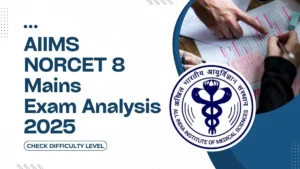The All India Institute of Medical Sciences (AIIMS), New Delhi, has officially announced the exam dates for the AIIMS NORCET 10 Exam 2026 for the post of Nursing Officer across India. As per the latest update, the Prelims CBT will be held on 11 April 2026 and the Mains CBT on 30 April 2026. With the exam dates now released, aspirants have a clear roadmap to begin their preparation strategically.
This article provides a detailed and practical roadmap to help candidates prepare effectively for both the Prelims and Mains stages of the NORCET 10 Exam. It covers exam pattern insights, 100-day study planning, subject-wise priorities, mock test strategies, and resource recommendations to help you approach NORCET 10 with confidence and clarity.
Understanding the Exam Pattern of AIIMS NORCET 10 Exam 2026
One of the best ways to effectively prepare for AIIMS NORCET 10 is to begin by understanding the exam pattern. The AIIMS NORCET 10 Exam consists of two stages: Paper 1, which is an objective test, comprises 100 multiple-choice questions with a time duration of 100 Minutes and Paper 2 consists of 160 multiple-choice questions with a time duration of 180 minutes.
| NORCET 10 Prelims Exam Pattern 2026 |
|||
| Subject | No. of Questions | Maximum Marks | Time Limit |
| Nursing Subjects | 80 | 80 | 72 Minutes |
| General Knowledge & Aptitude | 20 | 20 | 18 Minutes |
| Total | 100 | 100 | 100 Minutes |
- Negative Marking: 1/3 for each wrong answer
| NORCET 10 Mains Exam Pattern 2026 |
|||
| Subject | No. of Questions | Maximum Marks | Time Limit |
| Nursing Courses | 160 | 160 | 180 Minutes |
Preparation Strategy For AIIMS NORCET 10 Exam 2026
With AIIMS NORCET 10 just coming soon – Prelims on 11 April and Mains on 30 April 2026, this is the make-or-break time, especially for repeat aspirants who narrowly missed it last time. You’ve already seen the exam’s difficulty, pattern, and pressure – now it’s about refining your mistakes, boosting your speed, and going in with a battle-tested strategy. Here’s a focused, time-sensitive plan tailored to the final 45–50 days.
Start with a 3-Phase Mini SWOT Analysis
Before jumping into the grind, reflect on your NORCET 8 performance or your latest mock tests. Ask yourself:
- Strengths: Which subjects always score high for you?
- Weaknesses: Where do you keep losing marks, lack of clarity, silly mistakes, or incomplete syllabus?
- Opportunities: Which topics were partially prepared and can be revised quickly now?
- Threats: Time mismanagement? Panic during exams? Negative marking?
This 30-minute reflection can help you prepare a razor-sharp plan instead of wasting time randomly revising everything.
45-Day NORCET 10 Targeted Plan
At this point, you don’t need a fresh study plan – you need a smart revision strategy. Let’s break the 45-day window into 3 practical phases:
Phase 1: 10 Days
- Objective: Quick revision of basics and previous weak areas.
- Focus on:
- Medical-surgical, Pharmacology, and Community Health (these form the core of NORCET).
- Clearing doubts, watching revision videos, or using class notes.
- Practice topic-wise MCQs (50–70 daily).
Phase 2: 20 Days
- Objective: High-yield topics and exam favourites.
- Go through:
- Infection control, emergency drugs, communication, psych, and OBGY.
- Solve previous year NORCET papers and mocks every alternate day.
- Continue building your “Last-Minute Notes” file with formulas, drug values, lab normal ranges, etc.
Phase 3: 15 Days
- Objective: Full-length mocks + revision.
- Attempt 3-4 full mocks/week, but focus more on:
- Error analysis
- Time taken per question
- Guessing patterns
- Revise your hand-made High-Yield Notes religiously.
Pro Tip: Keep last 3 days before Prelims strictly for revision, no new topics.
Solve Questions in “Reverse Mode”
Merely solving MCQs won’t cut it at this stage, break them down analytically:
- Why is this the right answer?
- Why are other options wrong?
- Is this concept clinical, factual, or logical?
Doing this improves clinical judgment, something NORCET increasingly focuses on.
Create a “High-Yield Dump Book”
In one small notebook (or digital doc), keep jotting:
- Lab values and emergency drugs
- Infection control protocols (handwashing, PPE, etc.)
- Important classifications (e.g. burns, fractures, BP stages)
- Mnemonics for psychiatry, OBGY, community health
This becomes your 2-week power pack before Prelims.
Mock Tests: Play Smart, Not Just Hard
Don’t overdo mocks. Follow the 80:20 rule:
- Spend 20% time on solving, 80% on post-mortem:
- Which topics are you getting wrong?
- Are your errors factual, interpretational, or time-based?
- Are you making repeated guesses?
Track your accuracy vs time taken and work on question prioritisation.
Build a NORCET-Specific Mindset
NORCET is not like a college exam. It needs speed + sense + strategy. Train yourself for:
- Timed MCQ rounds: 50 Qs in 45 minutes
- Decision making: when to skip, mark for review, or guess smartly
- Digital exam environment: practice mocks on-screen, not just paper
This isn’t just about knowledge anymore; it’s about thinking like a nursing officer under pressure.
Subject-Wise Tips For AIIMS NORCET 10 Exam 2026
Cracking the AIIMS NORCET 10 Exam requires a focused approach, as it is highly competitive. Instead of relying on random study methods, having a structured subject-wise strategy will maximize the chances of success. Here are some preparation tips for each subject, designed to help aspirants score well.
1. Medical-Surgical Nursing
- Core Medical Specialities: Deepen knowledge in Cardiovascular, Neurology, Renal, Respiratory, Gastrointestinal, Endocrine, and Emergency Nursing.
- Pathology & Clinical Manifestations: Gain a thorough understanding of disease mechanisms, associated symptoms, and evidence-based nursing interventions.
- Case-Based Practice: Review and solve past exam case studies to enhance clinical reasoning and application of knowledge.
- Surgical & Emergency Care: Revise key surgical procedures, including preoperative and postoperative nursing care, as well as emergency response protocols.
2. Obstetrics & Gynaecological Nursing (OBG)
- Maternal & Neonatal Care: Focus on Antenatal, Intrapartum, Postnatal, High-Risk Pregnancy, Neonatal Care, and Family Planning.
- Labour & Newborn Assessment: Review the stages of labour, potential complications, APGAR scoring, and fetal monitoring techniques.
- Contraceptive Knowledge: Understand various contraceptive methods, their uses, and contraindications.
- Clinical Application: Practice scenario-based MCQs to enhance decision-making and clinical reasoning skills.
3. Pediatric Nursing
- Child Health & Development: Cover Growth & Development, Neonatal & Infant Care, Pediatric Diseases, and the Immunisation Schedule.
- Vaccination Protocols: Master the National Immunisation Schedule for accurate implementation.
- Pediatric Conditions: Study prevalent childhood illnesses such as pneumonia, malnutrition, and congenital anomalies.
- Developmental Milestones: Use mnemonics to easily recall key growth and development markers.
4. Psychiatric Nursing
- Psychiatric Nursing: Focus on Mental Disorders, Therapeutic Communication, Medications, and Legal Aspects.
- Disorder Management: Gain in-depth knowledge of Schizophrenia, Depression, Anxiety, and Bipolar Disorder, along with their treatment approaches.
- Pharmacology in Mental Health: Study psychotropic medications, their adverse effects, and nursing responsibilities.
- Legal & Ethical Guidelines: Review Mental Health Acts and ethical considerations in psychiatric care.
5. Community Health Nursing
- Public Health & Disease Prevention: Focus on Epidemiology, Communicable & Non-Communicable Diseases, and National Health Programs.
- Government Health Initiatives: Study key programs such as RNTCP, NVBDCP, and NACP.
- Healthcare Framework: Understand primary healthcare concepts, levels of disease prevention, and maternal & child health (MCH) services.
- Epidemiological Knowledge: Familiarise yourself with essential terms and formulas for effective data interpretation.
6. Fundamentals of Nursing
- Focus on these areas are Nursing Process, Infection Control, Vital Signs, and Basic Procedures. Revise the Nursing Process (ADPIE – Assessment, Diagnosis, Planning, Implementation, Evaluation).
- Learn infection control measures like hand hygiene, PPE, and sterilisation techniques.
- Practice calculation-based questions on IV flow rates and drug dosages.
7. Anatomy & Physiology
- Human Body Systems: Concentrate on the Cardiovascular, Respiratory, Nervous, Endocrine, and Musculoskeletal Systems.
- Physiological Functions: Understand organ functions, hormonal regulation, and essential physiological processes.
- Visual Learning: Utilise diagrams and charts to grasp nerve pathways and circulatory patterns.
- Active Recall: Practice labelling-type questions to reinforce knowledge and improve retention
8. Pharmacology Focus Areas:
- Drug Classification, Mechanism of Action, Side Effects, Antidotes.
- Memorise important drug classifications with mnemonics, revise side effects, contraindications, and nursing responsibilities. Focus on high-alert drugs and emergency medications.
10. Microbiology
- Microbiology & Infection Control: Cover Bacteria, Viruses, Fungi, Sterilisation Techniques, and Infection Control.
- Pathogen Identification: Study common microorganisms and their transmission methods.
- Preventive Measures: Learn essential infection control strategies and disinfection techniques.
- Applied Knowledge: Strengthen understanding by practising MCQs on gram-positive and gram-negative bacteria.
10. Nursing Research & Management
- Research & Leadership: Focus on Research Methodology, Leadership Styles, Ethical Principles, and Hospital Management.
- Scientific Inquiry: Study various research designs, data collection techniques, and statistical analysis methods.
- Healthcare Administration: Understand hospital management principles, delegation strategies, and legal frameworks.
- Ethical Foundations: Review core nursing ethics, including autonomy, beneficence, justice, and non-maleficence.
NORCET 10 Exam Preparation Resources 2026
Clearing the AIIMS NORCET 10 Exam is challenging, but with the right preparation strategies, it is achievable. Start by thoroughly understanding the AIIMS NORCET 10 Exam pattern and completing the syllabus, next, create a study plan that includes regular mock tests, with consistent efforts and a focused approach, candidates can turn their goal of success into a reality.
| Study material for AIIMS NORCET 10 Exam | ||
| Subject | Book Title | Author |
| Nursing Subject | Previous year Papers | Dr. Munish Bhatt M.D, Priya Goyal DNP |
| General Awareness | Lucent | r. Vinay Karna, Manwendra Mukul, and Sanjeev Kumar |
AIIMS NORCET 10 Online Courses
Adda247’s online courses and video lectures are highly beneficial. Visit the Nursing Adda247 YouTube Channel for proper guidance and video lectures. Once the syllabus is completed, candidates can go forward with additional resources to enhance their preparation.
AIIMS NORCET 10 Mock Tests
Regularly taking mock tests is vital to assess your preparation and identify areas for improvement. Adda247 offers high-quality Nursing Mock Tests that simulate the actual exam environment. Make it a habit to take at least one mock test per week as you get closer to the exam date.
After each mock test, analyse the performance thoroughly. Identify the weak areas and work on them. Keep track of the mistakes made and ensure to not repeat them. This analysis will help candidates understand their strengths and weaknesses better.




 AIIMS NORCET 8 Seat Allocation Notice 20...
AIIMS NORCET 8 Seat Allocation Notice 20...
 AIIMS NORCET 8 Mains Exam Analysis 2025,...
AIIMS NORCET 8 Mains Exam Analysis 2025,...
 AIIMS NORCET 8 Exam Analysis 2025, Check...
AIIMS NORCET 8 Exam Analysis 2025, Check...

 Adda247 Job portal has complete information about all Sarkari Jobs and Naukri Alerts, its latest recruitment notifications, from all state and national level jobs and their updates.
Adda247 Job portal has complete information about all Sarkari Jobs and Naukri Alerts, its latest recruitment notifications, from all state and national level jobs and their updates.




